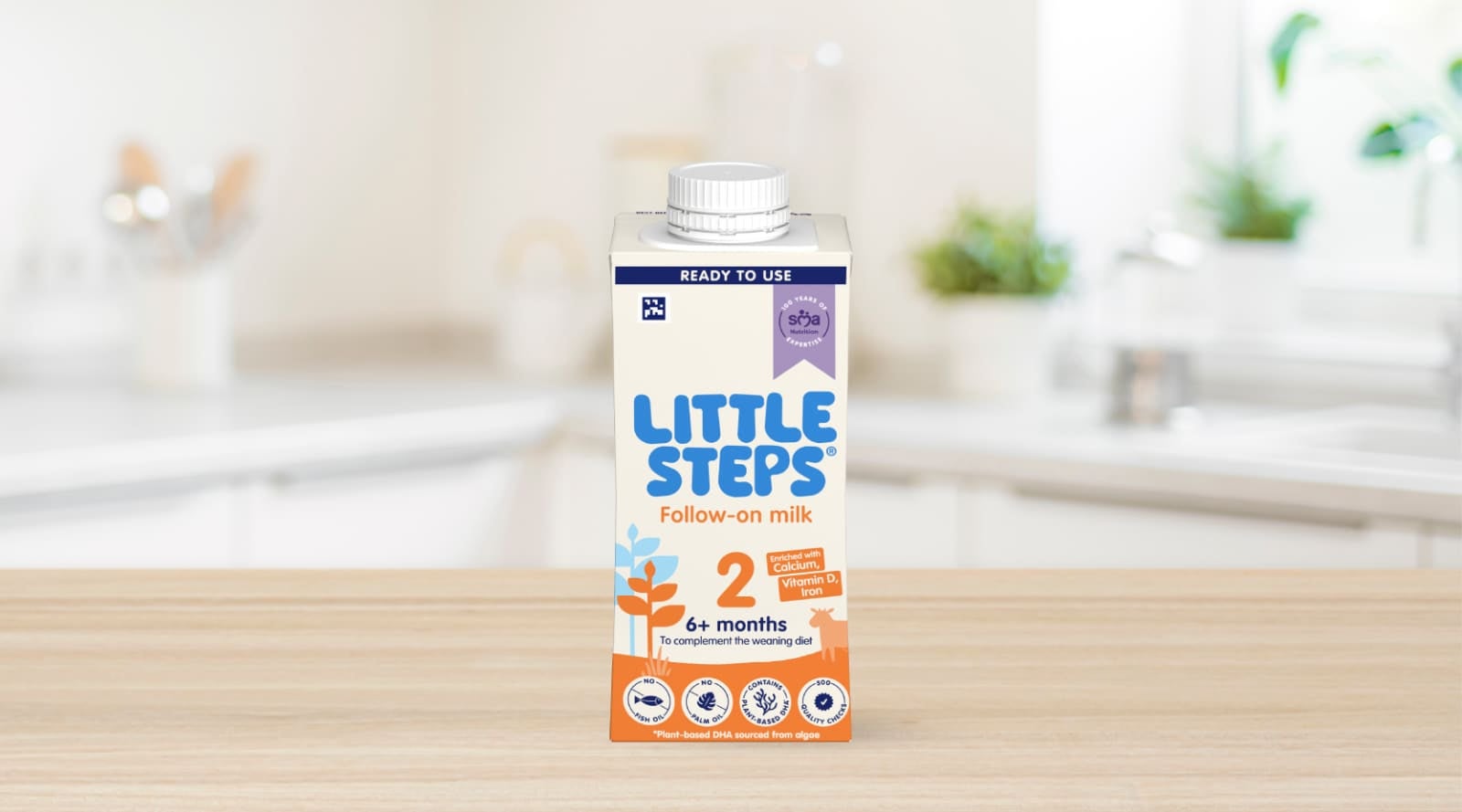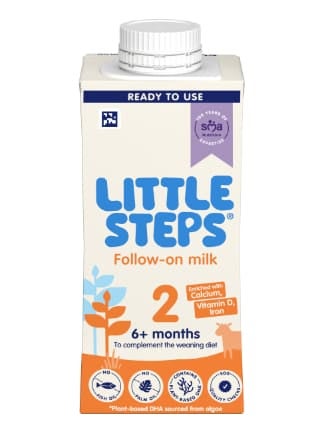6-12 Months
LITTLE STEPS® Follow-on Milk - Liquid
Stage 2 (6-12 months). To complement the weaning diet, suitable from 6 months +
HERE FOR THE LITTLE STEPS ALONG THE WAY
Every little thing your child does is a sign of development, and it’s a true joy to experience together.
Halal Certified
LITTLE STEPS® Follow-on Milk is designed for babies from 6 months onwards to complement the weaning diet and to help ensure they get good nutrition.
LITTLE STEPS® Follow-on Milk is enriched with Iron to help support normal cognitive development. It also contains Calcium and Vitamin D for the normal growth and development of bones. Vitamin D also contributes to the normal function of the immune system in children.
GOOD TO KNOW!
Babies who have 500 ml or more (about a pint) of LITTLE STEPS® Follow-on Milk a day will not need additional Vitamin D supplements.
Why LITTLE STEPS® Follow-on Milk?
Plant-based DHA is sourced from algae
Formats
Also available in powder formats:
800 g Powder
Easy open lid. Scoop can be stored in suspension inside the can. Use product within 4 weeks. Approximately 177 scoops per can.
How to prepare your baby's feed
Whilst this product is made under strict hygienic conditions, it is not sterile. Failure to follow instructions on preparation and storage may make your baby ill.
Feeding guide
6 to 12 months
All babies are different but try to ensure that from 6 months to 1 year your baby has 500 – 600 ml of LITTLE STEPS® Follow-on Milk per day, either as a drink, on cereals or mixed with food.
Important feeding information
- Check best before date.
- Once open, reseal carton and store only in the fridge (5°C or below) for up to 24 hours.
- For hygienic reasons, discard unfinished feed in the beaker/bottle as soon as possible, and always within 1 hour.
- For older babies, ready to use formulae can be poured over cereals and mixed with food.
- Do not alter or add to formulae unless medically directed.
- Do not warm feeds in microwave, hot spots may occur and cause scalding.
- Remember, cows’ milk should not be used as a drink during the first year.
- Do not freeze.
| Nutrition information per 100 ml prepared feed | ||||
|---|---|---|---|---|
| Nutrition information | ||||
| Typical values | ||||
| Energy | 280 kJ 67 kcal | |||
| Fat | 3.2 g | |||
| of which, saturates | 0.3 g | |||
| of which, mono-unsaturates | 2 g | |||
| of which, polyunsaturates | 0.6 g | |||
| Omega 3 | ||||
| - α-linolenic acid (ALA) | 42 mg | |||
| - Docosahexaenoic acid (DHA) | 17 mg | |||
| Omega 6 | ||||
| - Linoleic acid (LA) | 500 mg | |||
| Carbohydrate | 8 g | |||
| of which, sugars | 5.4 g | |||
| of which, lactose | 5.3 g | |||
| Protein | 1.5 g | |||
Ingredients
Water, skimmed MILK, whey permeate (MILK), vegetable oils (sunflower, rapeseed), maltodextrin, calcium citrate, emulsifier (SOYA lecithin), potassium citrate, oil from the microalgae Schizochytrium sp. (DHA), sodium citrate, vitamin C, calcium chloride, L-isoleucine, magnesium citrate, L-tryptophan, ferrous sulphate, antioxidants (tocopherol-rich extract, ascorbyl palmitate), zinc sulphate, vitamin E, niacin, pantothenic acid, copper sulphate, vitamin A, thiamin, vitamin B6, manganese sulphate, potassium iodide, folic acid, sodium selenate, vitamin K, vitamin D, biotin, vitamin B12.
Further reading
Have a look at our expert articles to see how you can give your baby the right nutrition for every stage of their development, from birth to toddlerhood.
Important notice
We believe that breastfeeding is the ideal nutritional start for babies and we fully support the World Health Organization’s recommendation of exclusive breastfeeding for the first six months of life followed by the introduction of adequate nutritious complementary foods along with continued breastfeeding up to two years of age. We also recognise that breastfeeding is not always an option for parents. We recommend that you speak to your healthcare professional about how to feed your baby and seek advice on when to introduce complementary feeding. If you choose not to breastfeed, please remember that such a decision can be difficult to reverse and has social and financial implications. Introducing partial bottle-feeding will reduce the supply of breast milk. LITTLE STEPS® Follow-on Milk is only suitable for babies over 6 months as part of a mixed diet. It should not be used as a substitute for breast milk during the first 6 months. The decision to start weaning or to use this product before 6 months, should be made only on the advice of a doctor, midwife, health visitor, public health nurse, dietitian or pharmacist, based on baby’s individual needs.














